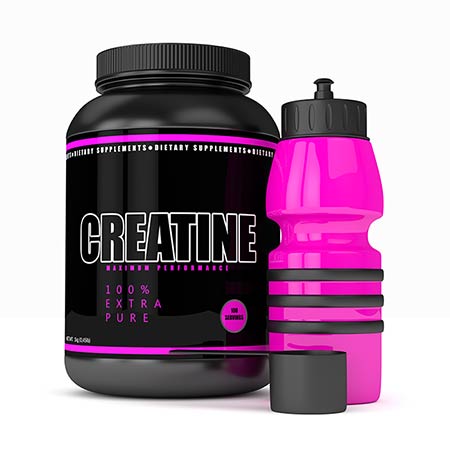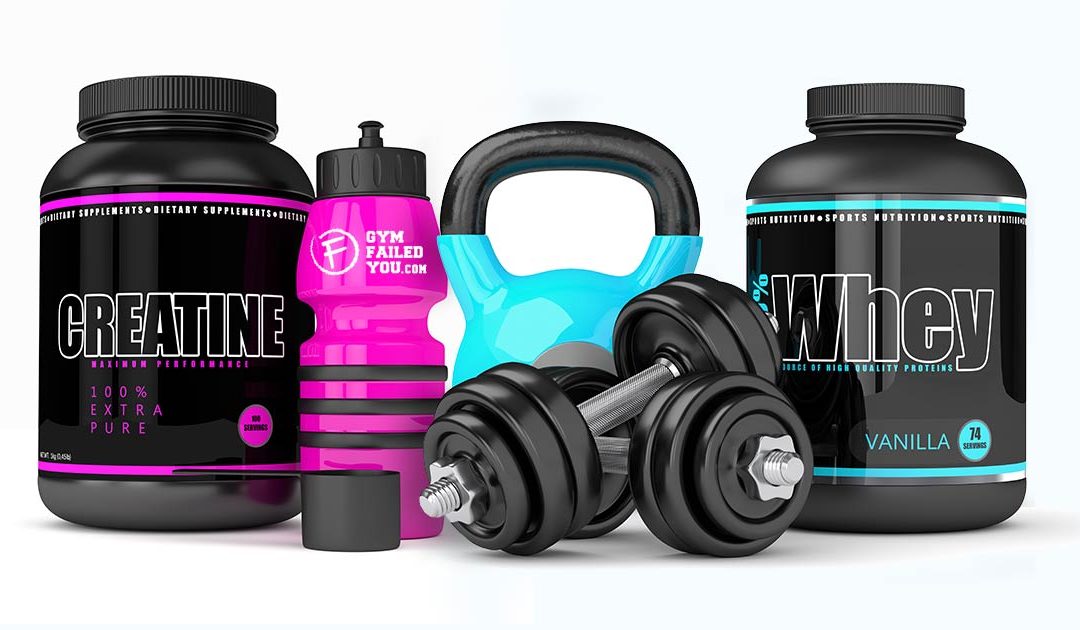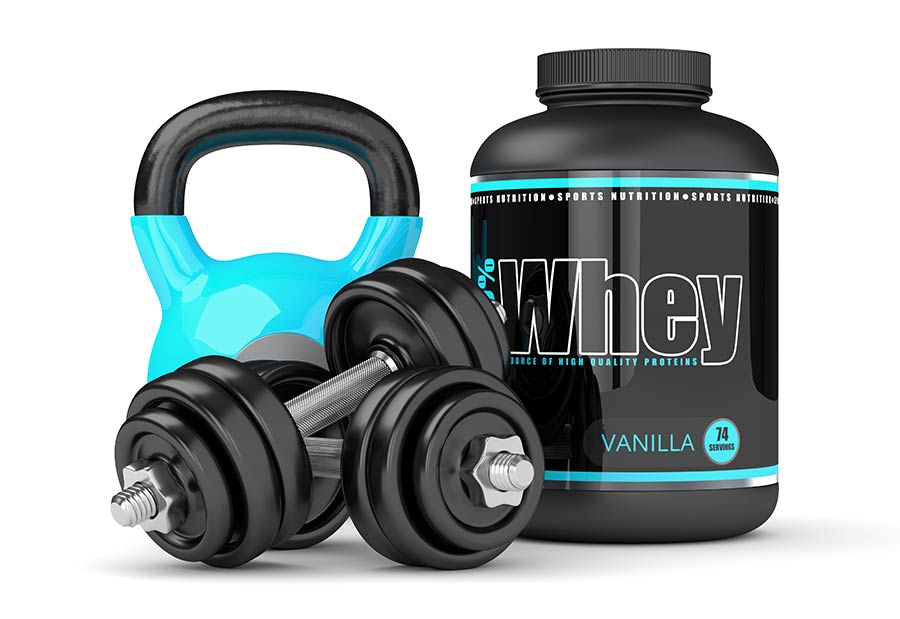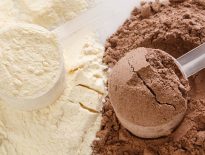If you’re looking to boost the results of your workouts supplements are where you might turn. At the top of your list is probably going to be creatine vs whey.
I don’t think there’s a supplement out there that has had more research than creatine. And for good reason! Creatine works and it works well. In fact, I’ll go out on a limb and state that creatine is one of the best bangs for the buck!
There is more information on the internet about creatine than almost any other supplement. And I had the good fortune to be studying in college at the time of creatine’s inception.
It was such a hot new supplement that I received several credits of “independent study” just for doing an in-depth literature review on creatine for my professors.
There are so many supplements on the market that may look good on paper, but the visible effects are minimal to none. I can sum up creatine in one word. Legitimate!
And whey is the close second to creatine. It too is an outstanding supplement that offers a great return on your investment.
Glynn’s Guide
Takeaways That Won’t Fail You
- Creatine is superior to other supplements for both effectiveness and bang for the buck.
- Its role is to help replenish ADP (diphosphate) to ATP (triphosphate).
- Creatine’s most recognizable attribute is helping to get “just one more rep.”
- There has been some promise in its ability to help with cognition and brain trauma.
- Add creatine to your whey protein and take immediately after exercise for the best outcome.
What is creatine?

We produce a small amount of creatine from a few amino acids, so it’s not essential. And we store creatine phosphate in most of our cells, but predominantly in muscle tissue.
But our capacity for storage is larger than what’s kept in store. That’s why we can supplement creatine to increase our “pools” for an on-demand need.
What does creatine do?
What creatine does can get very complex. So here’s a simplified explanation I’ve given over the years:
- In energy production, we use one phosphate group from ATP (adenosine triphosphate).
- This causes ATP to become ADP (adenosine diphosphate).
- So, tri (3) become di (2) phosphates.
- Now this sad and spent ADP molecule is hanging out in need of another phosphate.
- Creatine phosphate swoops in wearing a cape and says “I’ll give you a phosphate, so you can be strong again!”
- ADP humbly accepts the phosphate and is once again ATP. Nothing like a little “brotherly help!”
How is creatine absorbed?
When we supplement creatine, it’s absorbed in the small intestine. It relies on a sodium and chloride transport system.
Once circulating in the blood, it’s easily and rapidly taken up by the liver, skeletal muscle, kidneys, brain, and other tissue.
The majority ends up in the skeletal muscle. One more reason it’s a great supplement that offers a huge bang for the buck.
Creatine for training and other benefits
Using the explanation from above of how creatine works, let’s use a lifter squatting as an example.
Suppose an individual is squatting a weight that fails at 8 reps without the use of creatine. Well, they’ve exhausted their immediate ATP stores and the small amount of creatine loaning its phosphate group.
Now, let’s say we increase the size of that creatine “pool.” Then there are more phosphates to pass on and for ATP production. You can read that as a little more energy to get the 9th rep.
Make sense?
The additional stores of creatine have shown to be beneficial in a number of systems. Not just muscular.
Read on…
Creatine and brain tissue
There’s been a lot of accumulating research showing a positive impact on brain tissue from the supplementation of creatine.
It’s been shown to improve cognitive processing under multiple conditions. It also has a “protective effect” on brain tissue.
Rae states,
“creatine… plays key roles in the brain including buffering energy supply, improving mitochondrial efficiency, directly acting as an anti-oxidant and acting as a neuroprotectant.”
Dolan states,
“When considering the influence of supplementation strategies on cognitive processes, it appears that creatine is most likely to exert an influence in situations whereby cognitive processes are stressed, e.g. during sleep deprivation, experimental hypoxia, or during the performance of more complex, and thus more cognitively demanding tasks.
Evidence exists indicating that increased brain creatine may be effective at reducing the severity of, or enhancing recovery from mild traumatic brain injury….”
When to take creatine: pre-workout, post-workout or other?
There has always been a controversy as the best time to take creatine before or after a workout. Over the years, with piles of data, we can safely say that the differences are finite.
You’re relying on your “storage pool” during activity, so timing isn’t crucial.
BUT, some research has shown that there’s an improvement in uptake immediately following exercise.
In other words, if you’re looking to squeeze every ounce of benefit out of creatine, take it immediately after exercise.
How to take creatine
There are a few tried and true methods for using creatine. In the past, “the loading phase” was a big deal. It’s still part of the protocol, but it’s been found that long-term consistent use will achieve the same results.
So, load it for 5 days taking 5 grams 3-4 times a day. If you’re small-framed, the lower number is fine. Otherwise, stick with four times a day for 5 days.
Now, that said, if you just take 5 grams a day, you’re stored amount of protein will eventually reach a level as if you loaded.
If you’re in a hurry, load it. Otherwise, slow and steady will get you there too.
Taking it with a post-workout meal has been shown to increase its retention. I’m not convinced it’s necessary for the same outcome in the long run.
What is whey protein?
This one’s easy… cow’s milk. Milk is predominantly made up of two types of protein:
- Whey protein
- Casein protein
Whey protein has been in use for centuries. In the past, it was used as livestock feed, fertilizer, or thrown away.
Over time, we began using it as a food additive for many of the household food products with which we grew up. Before our chemical technology improved.
Whey protein has come such a long way as a supplement since then.
The improvements were driven by fitness enthusiasts. They were excited by how fast whey protein was absorbed and its abundant quantities (read that as inexpensive).
This drive improved the manufacturing of whey protein concentrates significantly. In both the chemical and functional properties. It led to the superior product we have today.
What does whey protein do?
Thanks to its overwhelming use by many industries, there is A LOT of research on what whey protein does. It is absorbed faster than casein. It also stimulates better muscle protein synthesis (growth) than casein.
To build muscle mass, at least 20 grams of whey protein should be ingested post-workout. This is the generally accepted standard for an average 176-pound male.
Based on those numbers we can easily adjust for sex and body composition for any individual. Read more about the science of protein digestion.
Is creatine in whey protein?
There are some manufacturers who add creatine to their whey protein. But otherwise, no, creatine is not found in whey protein.
That said, they are the best two supplements to combine. A quality product purchased in bulk of both creatine and whey goes a long way.
Keep things simple and add your creatine to your whey protein shake. Then drink it after your workout for the best outcome.
When should I take whey protein: pre-workout, post-workout or other?
You can learn more about this in my article BCAA vs Whey Protein: The Definitive Guide [Save Money], but here’s a summary:
Post-workout
Immediately after a strength training workout or endurance event. This will help if you’re either trying to spare muscle or add muscle. It also helps with recovery, minimizing muscle soreness.
Pre-workout
Thirty minutes before a strength training workout or endurance event. This helps to spare muscle.
The return on investment from creatine
Creatine is inexpensive. And it works really well.
We don’t need to complicate this section at all.
A daily spoonful works out to about 12 cents a day. I challenge anyone to find a supplement with such a large impact that costs that little.
Need I say more?
Is creatine safe?
For years, there was a big stink that creatine was dangerous. One more example of how the media loves to blindly look at one research article and amplify the findings. Regardless of its accuracy.
Well, three decades of research have proven that creatine is harmless. In fact, it’s been found as beneficial even outside athletics and fitness.
An old professor of mine (Jose Antonia) and now one of the premier researchers in sports nutrition sums up creatine very well in his review on creatine: Common questions and misconceptions about creatine supplementation: what does the scientific evidence really show?
So, yes, creatine is safe.
Head-to-Head Comparison Creatine vs Whey Protein
Budget for only one? Are you trying to decide to buy creatine or whey protein? Here is a guide to help you make your decision.
| Goal | Winner |
|---|---|
| Gain muscle | Whey protein |
| Get stronger | Creatine |
| Weight gain | Creatine |
| Weight loss | Whey protein |
| Workout recovery | Whey protein |
| Improve explosive power | Creatine |
| As a meal supplement | Whey protein |
| Least expensive | Creatine |
| Most convenient | Creatine |
My take on creatine vs whey protein
If you can only afford one supplement, make it creatine. You can still get your protein from whole food if whey is eliminated.
But not creatine in the quantity necessary. Look at the bright side, creatine is very inexpensive. Especially if you buy in bulk.
So, bottom line, there is no supplement that is a better bang for the buck! And since whey is its close second, combine them for a “dynamic duo!”
FAQs on Creatine & Whey
Are creatine supplements safe?
Yes, decades of research have proven that creatine is a very safe and beneficial supplement.
Who uses creatine?
Creatine is used by power athletes, weightlifters, and more recently by the aging population to help minimize muscle atrophy. There are also neural benefits.
How creatine helps?
Creatine loans ADP a phosphate to create ATP, which is the first line of energy production.
Can creatine cause acne?
No. It has no bearing on our sex hormones.
Will creatine help me lose weight?
No. It will actually cause a small increase in weight from the additional water it carries into the cell.
Can creatine make you angry?
Again, no. It has zero bearings on your sex hormones.
References on Creatine vs Whey Protein
Albl, Alice Alexandra. “A Review Of Creatine And Its Role In Muscle Strength And Balance,” Medicine, (2018).
Andres, S., Ziegenhagen, R., Trefflich, I., Pevny, S., Schultrich, K., Braun, H., Schänzer, W., Hirsch‐Ernst, K. I., Schäfer, B., Lampen, A., Creatine and creatine forms intended for sports nutrition, Mol. Nutr. Food Res. 2017, 61, 1600772.
Antonio J, Ciccone V. The effects of pre versus post workout supplementation of creatine monohydrate on body composition and strength. J Int Soc Sports Nutr. 2013 Aug 6;10:36.
Antonio, J., Candow, D.G., Forbes, S.C. et al. Common questions and misconceptions about creatine supplementation: what does the scientific evidence really show?. J Int Soc Sports Nutr 18, 13 (2021).
Philip John Ainsley Dean, Gozdem Arikan, Bertram Opitz & Annette Sterr, Potential for use of creatine supplementation following mild traumatic brain injury, CONCUSSION, March 2017, Vol. 2, No. 2.
Butts J, Jacobs B, Silvis M. Creatine Use in Sports. Sports Health. 2018;10(1):31-34.
Eimear Dolan, Bruno Gualano & Eric S. Rawson (2019) Beyond muscle: the effects of creatine supplementation on brain creatine, cognitive processing, and traumatic brain injury, European Journal of Sport Science, 19:1, 1-14.
A. V. Gaddi MD, P. Galuppo BS Micr., J. Yang MD, Creatine Phosphate Administration in Cell Energy Impairment Conditions: A Summary of Past and Present Research, Heart, Lung and Circulation, Volume 26, Issue 10, October 2017, Pages 1026-1035.
Rogerio R.Gerbatin, et al, Delayed creatine supplementation counteracts reduction of GABAergic function and protects against seizures susceptibility after traumatic brain injury in rats, Progress in Neuro-Psychopharmacology and Biological Psychiatry, Volume 92, 8 June 2019, Pages 328-338.
Gualano, B., Rawson, E.S., Candow, D.G. et al. Creatine supplementation in the aging population: effects on skeletal muscle, bone and brain. Amino Acids 48, 1793–1805 (2016).
Kreider, R.B., Kalman, D.S., Antonio, J. et al. International Society of Sports Nutrition position stand: safety and efficacy of creatine supplementation in exercise, sport, and medicine. J Int Soc Sports Nutr 14, 18 (2017).
Charles Onwulata, Peter Huth, Whey Processing, Functionality and Health Benefits, 2008 Blackwell Publishing and the Institute of Food Technologists.
Peeters Brian M.; Lantz, Christopher D.; Mayhew, Jerry L., Effect of oral creatine monohydrate and creatine phosphate supplementation on maximal strength indices, body composition, and blood pressure, Journal of Strength and Conditioning Research: February 1999 – p 3-9
Naderi A, de Oliveira EP, Ziegenfuss TN, Willems MT. Timing, Optimal Dose and Intake Duration of Dietary Supplements with Evidence-Based Use in Sports Nutrition. J Exerc Nutrition Biochem. 2016;20(4):1-12. doi:10.20463/jenb.2016.0031
Caroline D. Rae, Stefan Bröer, Creatine as a booster for human brain function. How might it work? Neurochemistry International, Volume 89, October 2015, Pages 249-259.
Jason E. Tang, Daniel R. Moore, Gregory W. Kujbida, Mark A. Tarnopolsky, and Stuart M. Phillips; Ingestion of whey hydrolysate, casein, or soy protein isolate: effects on mixed muscle protein synthesis at rest and following resistance exercise in young men, Journal of Applied Physiology, Vol 107, No. 3, September 2009, Pages 987-992.
Oliver C Witard, Sarah R Jackman, Leigh Breen, Kenneth Smith, Anna Selby, Kevin D Tipton; Myofibrillar muscle protein synthesis rates subsequent to a meal in response to increasing doses of whey protein at rest and after resistance exercise, The American Journal of Clinical Nutrition, Volume 99, Issue 1, 1 January 2014, Pages 86–95k.
Wu, G. Important roles of dietary taurine, creatine, carnosine, anserine and 4-hydroxyproline in human nutrition and health. Amino Acids 52, 329–360 (2020).





